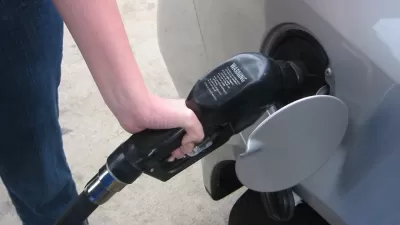The non-partisan Eno Center for Transportation has had it with futile attempts to raise the federal gas tax and the never-ending transfers (bailouts?) from the federal general fund to keep roads and transit funded. "Pay as you go" no longer works.
“The U.S. government’s current approach to funding surface transportation is not working,” the Eno report concludes, "because the federal fuel tax – the primary source of revenue for the Highway Transportation Fund (HTF} – has not been increased since 1993 “and neither political party wants to take the political risks of increasing it,” writes John D. Schulz, contributing editor of Logistic Management.
Starting in 2008, Congress has transferred a total of $65.3 billion from General Treasury funds to offset shortfalls in the HTF.
“The transfers were more accurately viewed as bailouts of a trust fund that Congress has not effectively managed,” Eno concludes, adding the current “pay-as-you-go” principle of user fees paying for transportation infrastructure no longer effectively exists.
If not the gas tax, then what?
Readers may not be surprised to see that one alternative the report recommends was the topic of a June New York Times op-ed (posted here) penned by their president and CEO, Joshua Schank, repasted below:
One option is to dedicate part of the income tax revenue that corresponds to transportation’s contribution to gross domestic product, or about 10 percent (around $160 billion). Dedicating even half of that to transportation would cover America’s needs and effectively align transportation with economic growth.
Here are the three alternatives indicated in the executive summary of the report [PDF], pages 3-5:
1. Adjust spending to match revenues;
2. Adopt a hybrid funding approach that relies on
both general funds and gas tax revenues, or;
3. Eliminate the HTF and pay for surface transportation
exclusively through the General Fund
One of the report's greatest strengths is its analysis of transportation funding in six other developed nations, none of which have transportation trust funds where fuel taxes are directly hypothecated. However, as Schulz notes, those countries have what the U.S. lacks:
That [U.S. fuel] tax – currently 18.4 cents on gasoline and 24.4 cents on diesel – is by far the lowest of six industrialized nations. In Germany, for instance, the national fuel tax is $3.43 per gallon, United Kingdom $3.55, Japan $2.00, Australia $1.29, and Canada 37 cents.
So while they may not have the equivalent of an HTF - they have substantial transportation user fees in the form of much higher gas taxes regardless of where that revenue goes.
What about the funding mechanisms that we have written about frequently as potential gas tax replacements, including the vehicle miles traveled (VMT) fee, indexing the gas tax, or wholesale sales taxes, as Sen. Barbara Boxer has recently suggested?
Only one mention of them - in the executive summary. Eno suggests that these user fees and taxes would meet the same fate as increasing the gas tax.
Numerous other funding sources and solutions have been floated, but all have eventually run up against similar political barriers. Proposals such as implementing a VMT fee, carbon tax, would all require Congress to raise taxes for the explicit purpose of funding transportation.
Getting Congress to vote for—and the President to sign off on—an increase in taxes of any kind is challenging enough on its own, but raising taxes specifically to fund transportation has not been accomplished in over 30 years.
The report, released December 3, was funded by The Rockefeller Foundation.
Hat tip to Ken Orski for his Dec. 19 newsletter, Innovation Briefs.
FULL STORY: Scrap Highway Trust Fund for new, sustainable funding model, says new Eno Foundation report

Alabama: Trump Terminates Settlements for Black Communities Harmed By Raw Sewage
Trump deemed the landmark civil rights agreement “illegal DEI and environmental justice policy.”

Study: Maui’s Plan to Convert Vacation Rentals to Long-Term Housing Could Cause Nearly $1 Billion Economic Loss
The plan would reduce visitor accommodation by 25% resulting in 1,900 jobs lost.

Planetizen Federal Action Tracker
A weekly monitor of how Trump’s orders and actions are impacting planners and planning in America.

Federal Homelessness Agency Places Entire Staff on Leave
The U.S. Interagency Council on Homelessness is the only federal agency dedicated to preventing and ending homelessness.

Restoring Northern India’s Himalayan ‘Water Temples’
Thousands of centuries-old buildings protect the region’s natural springs and serve as community wells and gathering places.

Milwaukee to Double Bike Share Stations
Bublr Bikes, one of the nation’s most successful, will add 500 new e-bikes to its system.
Urban Design for Planners 1: Software Tools
This six-course series explores essential urban design concepts using open source software and equips planners with the tools they need to participate fully in the urban design process.
Planning for Universal Design
Learn the tools for implementing Universal Design in planning regulations.
Caltrans
Smith Gee Studio
Institute for Housing and Urban Development Studies (IHS)
City of Grandview
Harvard GSD Executive Education
Toledo-Lucas County Plan Commissions
Salt Lake City
NYU Wagner Graduate School of Public Service




























